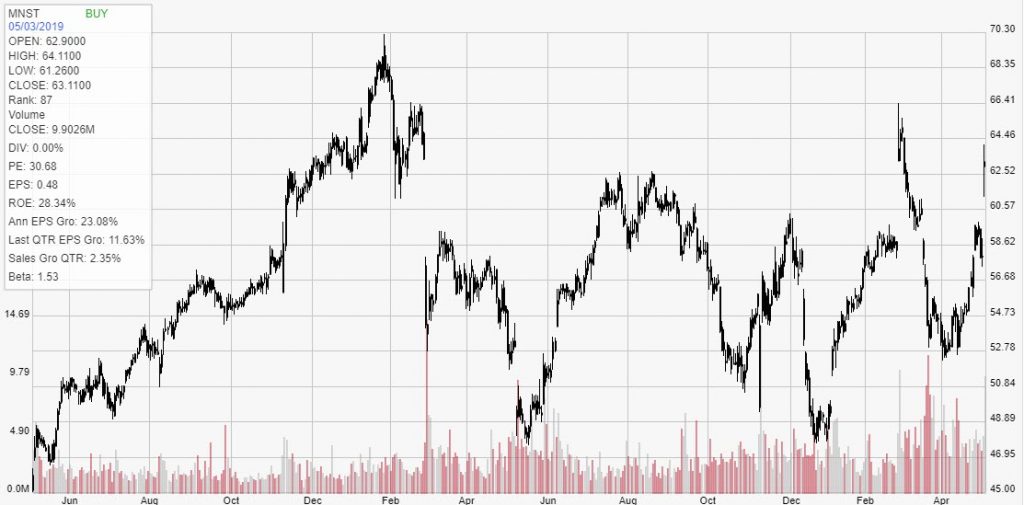Shares of Monster Beverage Corp. (MNST) surged during Friday’s session on the heels of a strong Q1 earnings report. The company surpassed both top- and bottom-line expectations, instigating massive buying behavior among market participants.
The energy drink company’s financials have managed to defy gravity in recent quarters even as health concerns surrounding its products continue to grow. With more and more studies coming out against its signature Monster Energy line, investors are curious as to exactly when the public outcry will start to affect the company’s profit growth.
Here’s a closer look at Monster’s first-quarter earnings report – and what Friday’s gain may indicate about the stock’s long-term performance moving forward…
The News
Monster reported earnings per share (EPS) of $0.48 for the January-March period, cruising past Wall Street’s $0.42 estimate by more than 14%. It also marked a year-over-year increase of 26.3% from $0.38 per share in Q1 2018. The company also surpassed the average revenue projection of $914 million by 3.5%, raking in a total of $946 million during the period. That also represented 11.2% growth from the $850.9 million reported in the year-ago quarter.
Growth was also strong outside the U.S., with product sales rising 17% over the last year and now accounting for 30% of company-wide sales. Revenue was not only bolstered by this strong demand but also by steadily climbing retail prices, as the average sales price for a case of Monster Energy drinks increased $0.12 – or 1.3% – to $9.29 in the first quarter.
How Investors Reacted
Investors loved the surprise earnings beat and pushed shares of MNST 8.8% higher from $57.99 at Thursday’s close to $63.11 on Friday. That was the highest settlement since March 4 when shares ended the day at $65.02 apiece. At Friday’s closing level, MNST is now up more than 28% from the Dec. 31 close of $49.22.
Monster was also Friday’s third top-performing S&P 500 component. It lagged right behind Newell Brands Inc. (NWL) and Flowserve Corp. (FLS), which respectively climbed 13.5% and 9.3% on the day.
The Bigger Picture
Monster’s huge earnings report appears all the more surprising when investors consider just how much the beverage products have been marred in controversy. Its Monster Energy line has – along with competing products like Red Bull and Mountain Dew Kickstart – been a central target of public concerns and new scientific research, which highlight the worsening effects that energy beverages have on heart health and diabetic issues.
Just this week, researchers from the University of Texas in Houston found that consuming drinks like Monster and Red Bull dramatically narrows blood vessels within just 90 minutes, increasing the risk of blockages that can lead to strokes and heart attacks. They also noted how the combination of common energy-drink ingredients – including high levels of sugar, caffeine, and taurine – could significantly damage artery linings, among other areas of the cardiovascular system.
Past studies have led governments to try to ban sales of energy drinks outright. After a Canadian study last year found that energy drinks are linked to seizures among young people and children, Canada and the U.K. moved to restrict sales, with the latter trying to ban sales to kids under 16 years old.
But U.S. sales have remained resilient in the face of international outcry. While some states are making strides – including Texas, where lawmakers want to prohibit the use of food stamps to purchase energy drinks and soda – average daily energy-drink consumption increased as much as 5.5% among young adults between 2003 and 2016, according to the American Journal of Preventive Medicine. In a U.S. survey performed by Statista last year, roughly 33.85% of all respondents aged 18 to 29 said they consume energy drinks on a daily basis.
Despite the health community’s negative perception of its products, Monster has persevered as an enormous success story. It has vaulted past earnings expectations for at least the last four quarters and maintains strong demand in the face of rising retail prices. The firm appears to be staving off the existential threat of shifting consumer tastes that have forced much larger companies to change their product strategies. For example, the Coca-Cola Co. (KO) – which owns nearly 17% of Monster – reacted to soda consumption hitting 30 year lows in 2016 by re-launching Coke Zero and other healthier alternatives. This led to earnings beats in Q2 2018, Q3 2018, and Q1 2019.
Looking Ahead
Even though its financials indicate otherwise, Monster remains an incredibly risky play for one huge reason: government intervention. The trend of governments curbing sales of energy drinks won’t be disappearing anytime soon, and Monster may feel more pressure as other companies – including its largest owner – make a show of moving away from these unhealthier products.
That being said, investors should take a wait-and-see approach to MNST stock. With shares at lofty highs, now’s likely not the best time to pour money into the beverage company. Investors should track the next few earnings reports to see if Monster’s bottom line truly starts to fall as a result of action from governments and health-advocacy groups.
